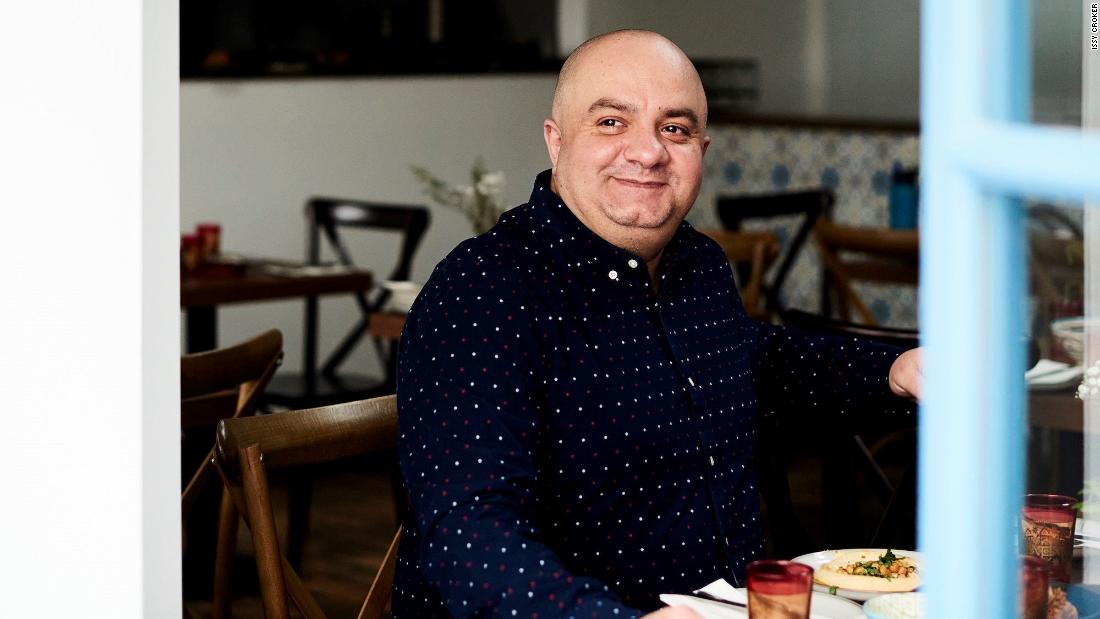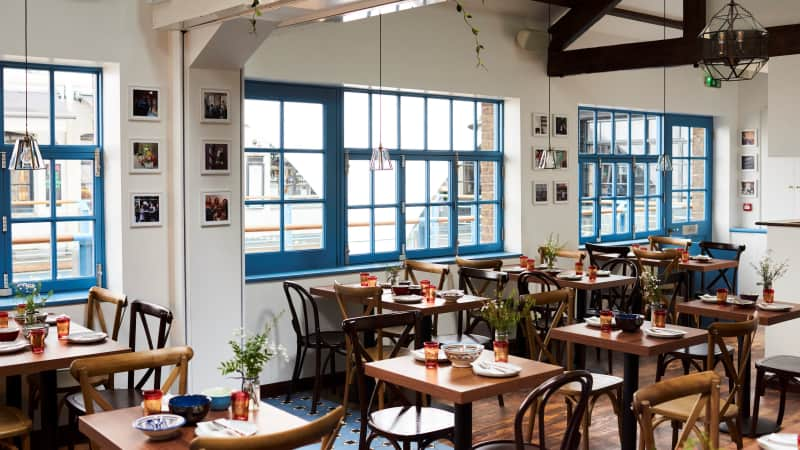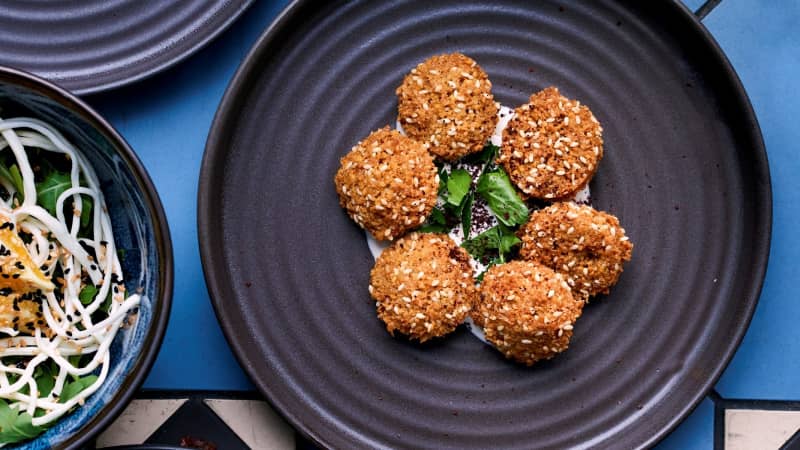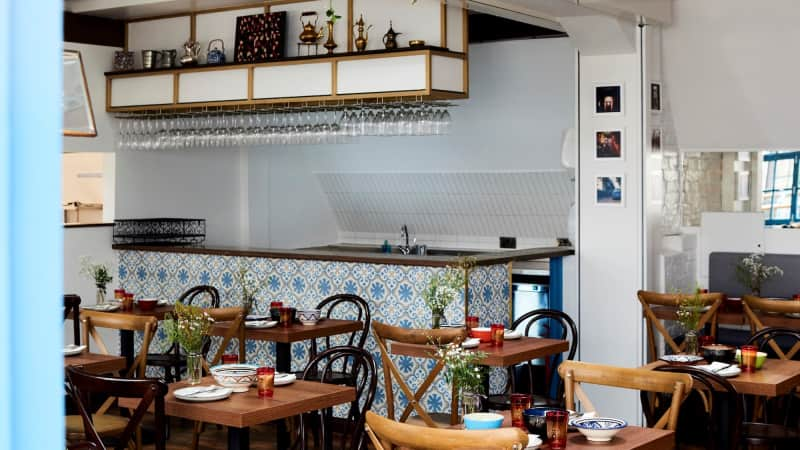(CNN) — In Damascus, chef Imad Alarnab says he ran three popular restaurants, alongside several juice bars and cafes. During the Syrian civil war, Alarnab’s businesses were destroyed, and Alarnab was forced to leave his home country.
Following what he describes as an arduous journey across Europe, Alarnab arrived in the UK in 2015, shelving his career as a restaurateur as he focused on finding work, and making a home for his family.
The supper clubs swiftly sold out, and Alarnab’s lunchtime falafel bars became a word-of-mouth hit, attracting crowds and long lines.
Before long, Alarnab was spending weekends cooking up a storm at weddings and birthday parties — an experience he describes as “absolutely beautiful.”
His ultimate dream was to open a restaurant in central London, but even as his culinary reputation grew, Alarnab didn’t know if this was an achievable goal in the face of high London rents.
While some refugees have to retrain to work in a new country, Alarnarb points out that great food is universal, and says he always knew he’d find a way to cook for a living.
Homely feel
The interior of Imad’s Syrian Kitchen — light and airy with pops of blue tiles — was designed by Alarnab to be “very simple,” and to resemble a home in Damascus.
The name of the restaurant says it all.
“It’s a kitchen — it’s my kitchen — and this is my dining area. I love it that way,” Alarnab says.
“Usually when you go to any other Middle Eastern restaurant, you will find a little bit of mosaic, wood — we have this, but not in our houses, it’s all in restaurants,” he says. “I didn’t want to create another typical Middle Eastern restaurant. Instead, I always wanted to create something more homey, more cozy.”
Lining the walls are photographs of Alarnab’s journey so far.
“One of them from my neighborhood in Damascus, some of them in London with my family…”
Alarnab crowdfunded £50,000 (around $68,300) in the fall of 2020 to help secure the lease. The restaurateur plans to donate this money back to Choose Love — £1 from each bill goes to the UK refugee charity.
Alarnab says working with charities “just adds to the business. It doesn’t take anything from it.”
It’s part of the ethos with which he says he lives his life.
“I do believe in karma,” he says. “It’s always been that way, when I do something good, honestly, I know for sure that there is something good will wait for me.”
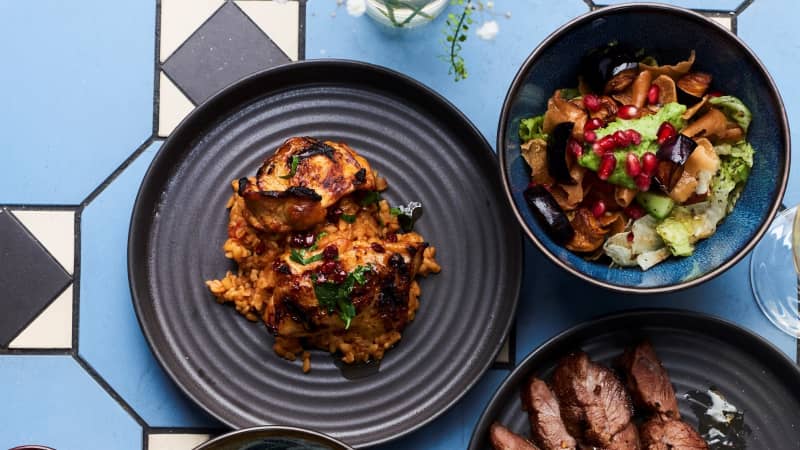
Imad Alarnab serves up Syrian dishes in his London eatery, including Jaj Barghol (chicken thigh with bulgur wheat) and Fattoush Baitinjan (aubergine, cucumber and avocado), pictured here.
Issy Croker
Londoners have poured into Imad’s over the summer months, salivating over the menu, enjoying the friendly atmosphere and chatting to Alarnab about his food.
Still, opening a restaurant during a pandemic was a risk. Over the UK’s Covid-19 lockdowns, restaurants were banned from opening their doors, and many struggled to survive.
Alarnab says while his rent is more affordable due to Covid’s impact on the London restaurant scene, he knew opening in 2021 was going to be a tough feat.
But it was a gamble he wanted to take.
“I thought, ‘It’s now or never, I’ll take my chances,'” he recalls.
Alarnab says he runs Imad’s Syrian Kitchen similarly to how he operated his eateries in Damascus. The main difference is his Soho space has a small kitchen, so the menu is slimmed down, but each dish has been perfected — and the food’s designed for sharing, adding to the homely feel.
Alarnab also adapted a few recipes to make them gluten-free or vegan. He says he enjoys the creativity that comes with making these kinds of adjustments. He also likes sampling other cultures’ dishes.
“It’s really nice to be involved with other cuisines and create something together — either spice, or technique, or new taste, or new way to plate up,” he says.
While Alarnab enjoys creativity and collaboration, he also knows when a dish shouldn’t be tampered with. Take his falafel — for those in the know, it’s the gold standard, and Alarnab says the key is in its simplicity.
“People try to play with traditional recipes where it’s good enough like it is — and you don’t really have to add too much to it, to make it,” he says.
If you add too many extra ingredients to falafel, you can ruin it, says Alarnab.
“I’m not saying that we shouldn’t create new recipes, but creating new recipes doesn’t really mean that we need to change […] traditional recipes we have already.”
Shared humanity
Alarnab is proud of and excited by the success of Imad’s Syian Kitchen, but it’s his family who bring him the most joy. He says his personal life is “the most important part.”
Alarnab spent a year apart from his family before they followed him to England. He says this period of separation was extremely tough, and he’s glad his loved ones are now thriving in London.
“My wife and daughters, they are more happy than ever,” Alarnab says. “We are connecting to each other more than ever. They are doing great at their schools.”
The recent Afghanistan crisis, coupled with UK Home Secretary Priti Patel’s policies aimed at preventing migrants crossing the English Channel, has intensified conversations about refugees in the UK in recent weeks.
Alarnab says the issue is that some people view refugees as if they come from “a different planet.”
“Maybe they have their own culture, but at the very end, they are human beings,” he says.
Too often, says Alarnab, people will describe refugees as either “angels” or “devils.”
“It’s not either — we are not either — we are just a human being,” he says.
Becoming a refugee is not a choice, adds Alarnab.
“If the war in Syria didn’t happen, I would never, never think about leaving Damascus in my life. But we’re forced to leave our countries — it’s not something optional.”
“Before you say that Syria is safe, and you want to send people back there — don’t do it. It’s not safe,” he says.
“Ask us about it, we know about Syria more than anyone else. We still have friends there. We still have families there.”
As for UK policies on asylum seekers under Patel, Alarnab says they don’t reflect the attitudes of the London he knows, sees and celebrates every day in his restaurant.
“She doesn’t represent London. People represent London,” he says. “And people are amazing.”
